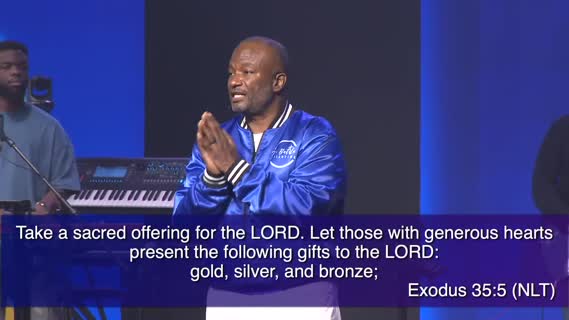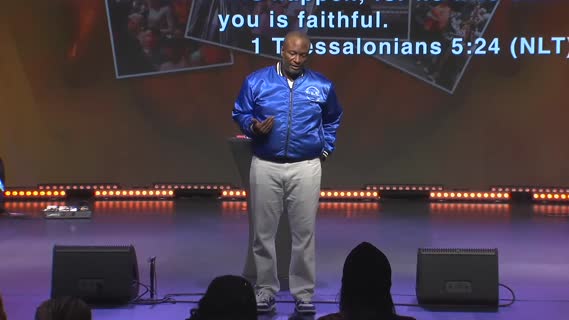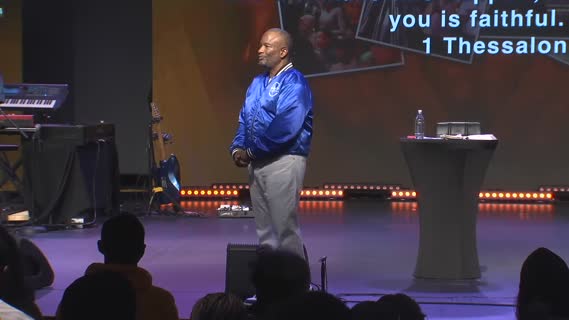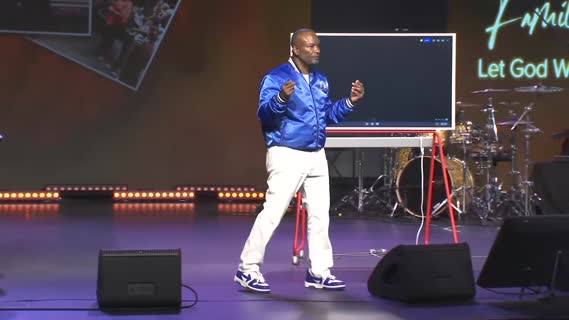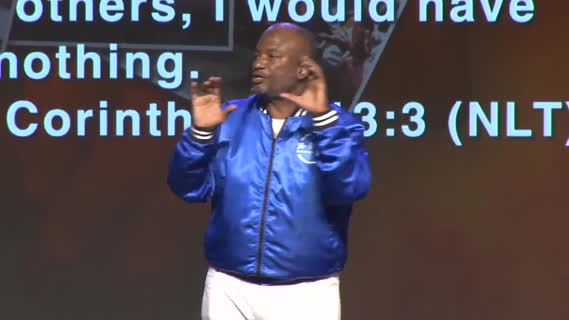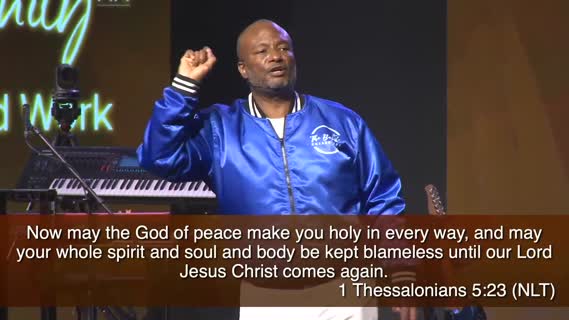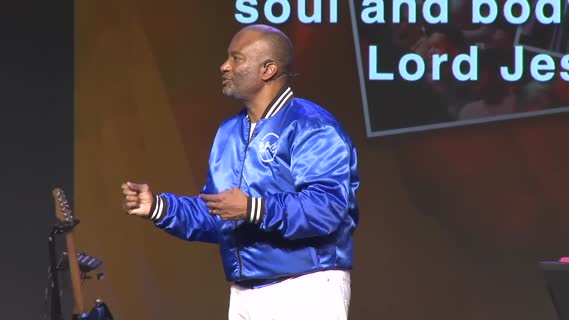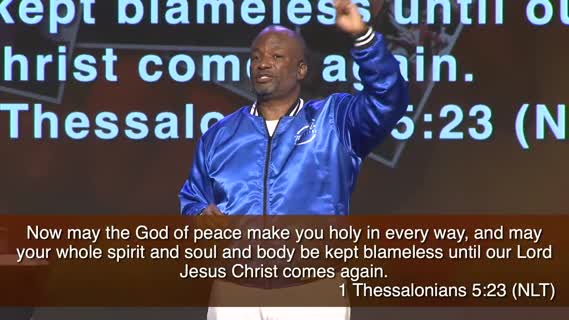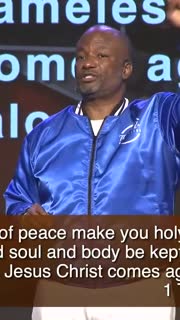Embracing God's Faithfulness and Holistic Transformation
Devotional
Sermon Summary
Bible Study Guide
Sermon Clips
### Quotes for Outreach
1. "But I'm so grateful that God, no matter how much He has to repair us and work on us and clean us up, no matter how many times we crash and fail and burn and blow it and say the wrong thing and do the wrong thing, He still won't let go of us. Amen. That's a blessing right there. Anybody grateful for that?" [17:02]
2. "Giving is sacred. That is the thing I want you to understand. Out of all of your financial portfolio, this is the one part that is sacred. Saving money, that's important. Spending money wisely, that's important. Investing money, that's important. Diversifying your investment, all that's important. But this right here, this is sacred. Because this is sacred. This is the way we honor God in our giving and in our money. And that's why he wants first place in our money." [24:02]
3. "Let God work. Let him work. Let him do his thing. Let him do it. You have no idea who you just spoke to that needed to hear that. That needed to know I don't have to carry this by myself. I don't have to figure this all out by myself. I've been carrying too much weight. I've been doing too much. Let God work. He knows all about it. I don't care if it's medical or financial. Let God work. If it's a family situation, let God work." [32:49]
4. "The way you let God work in your life is you just ask him. You just ask for God. Help me. Help me, Lord. It's just that simple. He wants to help you. It's almost like if you ever see a child, your child struggling with something, and you know how with children getting to a certain age, they don't want no help. I don't even know what that age is, and I got it. And you see everything they're doing wrong. You see why it's not working, and everything in you wants, because you don't want to see your child suffer. But you gotta be invited into it. And if your child, after struggling and struggling, this is how you can talk to God. You can just say to God, Lord, help me." [01:11:29]
5. "What a friend we have in Jesus. All our sins and grieves are bare. What a privilege to carry everything to God in prayer. Oh, what peace we often forfeit. And oh, what needless pains we bear, all because we don't carry everything to God in prayer. The way you let him work in your life is just ask him, Lord, help me." [01:12:28]
### Quotes for Members
1. "So when we say let him work, God needs permission to move in spaces in our life. And the way you let him work is you let him work. You just ask. Lord, help me here. Help me in this way. Help me in this area of my life. Help me in all areas of my life. Now, in this passage, in this passage in verses 19 and 20, he starts off by telling us two areas of our life where he wants to work. But he needs us to let him do it. And he starts by telling us two, gives us two directives of things not to do. He says, first of all, do not stifle the Holy Spirit." [39:14]
2. "The reason why the church is so messed up is because we got gifted people that aren't godly. So you got the gift, but you don't have no fruit. So you're anointed and you're annoying. Right? And the reason why you're anointed and you're, and you're annoying is because you're heavy on gift, but you're light on fruit. So you can preach and you can entertain and you are, you're, you're gifted. You can sing, you can do all this great stuff, but you don't know how to treat people." [47:49]
3. "Every single person that has a personal relationship with God has a level of holiness. There's a level of holiness that we all have by virtue of having his divine nature inside of us. The moment you accept Jesus Christ as your Savior and invite him to your life. God takes up residence in you and there's a level of holiness we all have. All of us have it. But how many of you have to admit that I'm not holy in every way? Put your hand up if you ain't holy in every way. Because if you don't put your hand up, we'll know which way you're not holy in. I got some ways that ain't holy. And God says, I'm trying to make you holy in every way. In every way." [01:02:21]
4. "He says, I want you to be holy in every way. Somebody say, let him work. Let him work. Holiness in every way of our life. I want you to be holy. I want you to... Because... Now, it's not... He says, I'm not asking you all to do it, Church of Thessalonica. I'm not asking you to do it, Zion Church. I'm not asking you to somehow power up and become holy. He says, I'm expecting God to do it. He says, may the God of peace make you holy in every way. The good news is that God's not expecting us to do it without him. He says, I can help you be holy. I'm willing to do this with you. It's going to be a partnership. I don't have to do it on my own, but I got to work with God." [01:02:56]
5. "We are triune just like God is. God is Father, Son, and Spirit. We are spirit, soul, and body. And he puts it in the right order. He says, it starts with your spirit. That's first. Your soul is next, and your body is third. He puts it in the right order. Your spirit is the most important part of who you are. Your spirit is the part of you that connects with God. It is the part of you, check this out, according to Ephesians chapter 1, that is dead before you come to salvation. The Bible says we were dead in our trespasses and sin, and God has made us alive. Every person who is born again, that is a spiritual resurrection." [01:05:17]
Ask a question about this sermon
1. "But I'm so grateful that God, no matter how much He has to repair us and work on us and clean us up, no matter how many times we crash and fail and burn and blow it and say the wrong thing and do the wrong thing, He still won't let go of us. Amen. That's a blessing right there. Anybody grateful for that?" [17:02]
2. "Giving is sacred. That is the thing I want you to understand. Out of all of your financial portfolio, this is the one part that is sacred. Saving money, that's important. Spending money wisely, that's important. Investing money, that's important. Diversifying your investment, all that's important. But this right here, this is sacred. Because this is sacred. This is the way we honor God in our giving and in our money. And that's why he wants first place in our money." [24:02]
3. "Let God work. Let him work. Let him do his thing. Let him do it. You have no idea who you just spoke to that needed to hear that. That needed to know I don't have to carry this by myself. I don't have to figure this all out by myself. I've been carrying too much weight. I've been doing too much. Let God work. He knows all about it. I don't care if it's medical or financial. Let God work. If it's a family situation, let God work." [32:49]
4. "The way you let God work in your life is you just ask him. You just ask for God. Help me. Help me, Lord. It's just that simple. He wants to help you. It's almost like if you ever see a child, your child struggling with something, and you know how with children getting to a certain age, they don't want no help. I don't even know what that age is, and I got it. And you see everything they're doing wrong. You see why it's not working, and everything in you wants, because you don't want to see your child suffer. But you gotta be invited into it. And if your child, after struggling and struggling, this is how you can talk to God. You can just say to God, Lord, help me." [01:11:29]
5. "What a friend we have in Jesus. All our sins and grieves are bare. What a privilege to carry everything to God in prayer. Oh, what peace we often forfeit. And oh, what needless pains we bear, all because we don't carry everything to God in prayer. The way you let him work in your life is just ask him, Lord, help me." [01:12:28]
### Quotes for Members
1. "So when we say let him work, God needs permission to move in spaces in our life. And the way you let him work is you let him work. You just ask. Lord, help me here. Help me in this way. Help me in this area of my life. Help me in all areas of my life. Now, in this passage, in this passage in verses 19 and 20, he starts off by telling us two areas of our life where he wants to work. But he needs us to let him do it. And he starts by telling us two, gives us two directives of things not to do. He says, first of all, do not stifle the Holy Spirit." [39:14]
2. "The reason why the church is so messed up is because we got gifted people that aren't godly. So you got the gift, but you don't have no fruit. So you're anointed and you're annoying. Right? And the reason why you're anointed and you're, and you're annoying is because you're heavy on gift, but you're light on fruit. So you can preach and you can entertain and you are, you're, you're gifted. You can sing, you can do all this great stuff, but you don't know how to treat people." [47:49]
3. "Every single person that has a personal relationship with God has a level of holiness. There's a level of holiness that we all have by virtue of having his divine nature inside of us. The moment you accept Jesus Christ as your Savior and invite him to your life. God takes up residence in you and there's a level of holiness we all have. All of us have it. But how many of you have to admit that I'm not holy in every way? Put your hand up if you ain't holy in every way. Because if you don't put your hand up, we'll know which way you're not holy in. I got some ways that ain't holy. And God says, I'm trying to make you holy in every way. In every way." [01:02:21]
4. "He says, I want you to be holy in every way. Somebody say, let him work. Let him work. Holiness in every way of our life. I want you to be holy. I want you to... Because... Now, it's not... He says, I'm not asking you all to do it, Church of Thessalonica. I'm not asking you to do it, Zion Church. I'm not asking you to somehow power up and become holy. He says, I'm expecting God to do it. He says, may the God of peace make you holy in every way. The good news is that God's not expecting us to do it without him. He says, I can help you be holy. I'm willing to do this with you. It's going to be a partnership. I don't have to do it on my own, but I got to work with God." [01:02:56]
5. "We are triune just like God is. God is Father, Son, and Spirit. We are spirit, soul, and body. And he puts it in the right order. He says, it starts with your spirit. That's first. Your soul is next, and your body is third. He puts it in the right order. Your spirit is the most important part of who you are. Your spirit is the part of you that connects with God. It is the part of you, check this out, according to Ephesians chapter 1, that is dead before you come to salvation. The Bible says we were dead in our trespasses and sin, and God has made us alive. Every person who is born again, that is a spiritual resurrection." [01:05:17]



